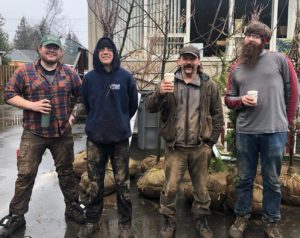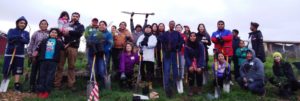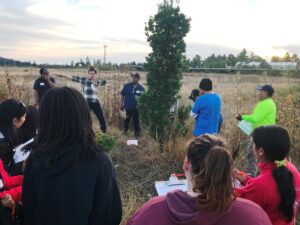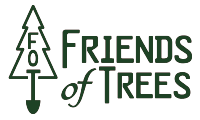Tag: community benefit organization
Get to know our partner: Wisdom of the Elders

“Partnering with Friends of Trees has helped teach Wisdom interns management skills; we learn how to manage a business, how to engage with business people, it prepares everybody for employment.” – Alvey Seeyouma, Wisdom Workforce Development Program Coordinator and Crew Leader Supervisor
The Wisdom of the Elders-Friends of Trees partnership began four years ago when our Neighborhood Trees Program needed some post-planting help. We had a number of street trees that didn’t get planted at a Saturday planting event and we were able to contract with Wisdom Workforce to plant those trees.
Soon after that first partnership experience, Wisdom hosted a community conversation for its partners, toward sharing information about how best to partner together in a way that is thoughtful and respectful. We participated in a Talking Circle, where there was honest communication about the native perspective on the dominant culture and environmental issues.
The partnership grew, and Wisdom’s post-planting support evolved to include mulching newly planted trees. Wisdom participants also began engaging on planting day, through training and participating as Crew Leaders, which provided opportunities for the organizations to work together more closely. We’ve now added pruning as a partnership element, providing even more hands on tree care experience.
Wisdom Workforce Program Coordinator Alvey Seeyouma participated in the Urban Forestry Training Program and, through that program, interned with Friends of Trees. Alvey says that the benefits of the partnership extend beyond Friends of Trees and Wisdom of the Elders, “Oh my gosh, I think our partnership benefits all communities. It helps the Wisdom crew leaders become more comfortable with their engagement with the community, so it benefits everyone.” He lists some more benefits of the partnership, “Wisdom interns are learning new skills through the community tree planting events. They’re learning about tree identification, planting techniques, and about community engagement through training as Crew Leaders.”
What would Alvey want folks to know about Friends of Trees? “Friends of Trees is a great organization. Everyone in the office, they’re so helpful, so kind and generous. They want everyone’s experience to be positive; they’ve offered so much training, which we are so grateful for.” Friends of Trees is equally grateful for the opportunity to enhance our organization and our community tree planting events through partnering with Alvey and everyone at Wisdom of the Elders.
Wisdom of the Elders records and preserves traditional cultural values, oral history, prophesy and other messages of guidance from indigenous elders in order to regenerate the greatness of culture among today’s and future generations of native peoples. Learn more at www.wisdomoftheelders.org
Pictured above: Matt, Bruce, Dave and Will of Wisdom of the Elders at a recent SE Portland tree planting event.
This story is from the January 2020 edition of our e-news, Treemail; check out other issues of Treemail here.
Partnering with Community Benefit Organizations to plant trees + grow community

“CBO partnerships are especially important for an environmental organization like Friends of Trees because they help us effectively reach low income communities and communities of color, communities that are impacted first and the most by climate change.” -Surabhi Mahajan, Friends of Trees’ Equity, Diversity, and Inclusion Specialist
Trees + community is so much more than volunteers planting trees together. True community means that a diverse population has access to all of the benefits of trees, especially historically underserved communities of color. And in order to reach diverse communities we need a diverse range of partnerships.
Friends of Trees is fortunate to enjoy some amazing partnerships, and some particularly amazing partnerships are with Community Benefit Organizations (CBOs). CBOs are community-based nonprofit organizations, are often culturally specific, and provide some sort of community benefit. An example in Portland is Verde, which among other services provides workforce training for the Latinx community.
Friends of Trees’ CBO partners include Verde, Wisdom of the Elders, Black Parent Initiative, the Blueprint Foundation, APANO, and POIC. Most of these organizations are partners in our Urban Forestry Training Program*, which helps connect adults to jobs in the Urban Forestry field (learn more about this program here). Beyond this joint endeavor our CBO partnerships take a few forms:
Verde and Wisdom of the Elders each support our tree planting work through planting event preparation, participation, and follow-up, including post-planting tree care. Verde also provides some contractor services at our Portland office on NE MLK Jr. Blvd (get to know more about Wisdom in the next story).
Black Parent Initiative is a community-based organization that serves Black families or families with Black children through home care visits, economic job opportunities, and other services. The FOT-BPI partnership supports connecting Black families in Portland to nature and to tree planting events, as well as connecting to job training programs in the urban forestry and restoration sector.
The Grounding Waters program of the Blueprint Foundation exposes Black urban youth to careers in environmental science, and paid workforce training with Friends of Trees is part of the program. Grounding Water youth train and participate in planting events as Crew Leaders; Grounding Waters youth will also train and participate as Summer Inspectors, checking on the health of trees planted through our Neighborhood Trees Program, which will provide additional learning opportunities. * Note: The Blueprint Foundation is not a current partner in the Urban Forestry Training program, but is considering the program.
Our partnership with the Asian Pacific American Network of Oregon (APANO) focuses on the Jade Greening Project, which is working to increase the canopy of East Portland’s Jade District. Friends of Trees’ involvement includes tree-planting events and targeted community outreach toward getting more trees planted and volunteers engaged. A new feature of this partnership includes our first intern from APANO, whose focus has been supporting planting events through securing food donations from diverse neighborhood businesses and joining the planting teams.
Our partnership with Rosemary Anderson High School’s Portland Opportunity Industrialization Center (POIC) involves hands-on job training and leadership skill-building with high school students. Each season 10-14 POIC students train to be Crew Leaders and they participate in planning and leading Friends of Trees planting events; the students receive stipends as part of this program. Read more about this partnership in our December 2016 edition of Treemail.
Our CBO partnerships provide countless benefits, to both Friends of Trees and to our community. When youth are able to experience leadership positions, and when diverse communities have access to training that leads to internships and jobs with green organizations, preconceived barriers about green jobs and environmental engagement start to break down. Further, the youth interns can serve as role models for other youth volunteers, particularly for young people of color who can be inspired when someone who looks like them has a leadership role.
These partnerships also have an environmental justice aspect. Many of our partners and interns serve or live in under-canopied areas that experience greater impacts from climate change, such as heat islands. Involvement with community tree planting provides a way for participants to address some environmental inequities firsthand.
Equitable partnerships represent a core value of Friends of Trees and are critical to true community building, and we strive toward fostering this type of partnership in the work we do. We are thankful to the support of the City of Portland’s Bureau of Environmental Services and East Multnomah Soil and Water Conservation District for support that helps make these partnerships possible.
Pictured above: Urban Forestry Training Program participants from project partners POIC, APANO, Wisdom of the Elders, Verde, the Black Parent Initiative, and the Pathways to Farming program.
This story is from the January 2020 edition of our e-news, Treemail; check out other issues of Treemail here.
Future Urban Forestry & Restoration Professionals: A new education & training program

“One of the things I love most about Friends of Trees and this program is it’s helping me expand my understanding of community. I get to go to all of these places I never knew about and plant there. That is one of my things I’m personally striving for – learning more about my community.” Alyssa, POIC leader and Adult UF training program participant
Friends of Trees recognizes that not everyone has equal access to the benefits of urban trees and healthy green spaces. During the past five years, we have made concerted efforts to include equity, diversity, and inclusion in all aspects of the organization, including hiring practices, volunteer recruiting, and planting street and yard trees in under-served, under-canopied neighborhoods. We also recognize that our region’s urban forestry landscape would benefit from EDI efforts, and the diverse communities we work to engage and serve would benefit from opportunities to engage directly with urban forestry.
Our Adult Urban Forestry Training & Internship Program, funded by the East Multnomah Soil & Water Conservation District, is a 12 week, paid training program focusing on urban forestry and restoration topics. The 12 program participants were selected by local Community Benefit Organizations (APANO, POIC, VERDE, and Wisdom of the Elders) that are also Friends of Trees partners. Program participants attended weekly training sessions focusing on landscape design, tree identification, tree maintenance, ecological site design, environmental justice, and careers in urban forestry.
Key components of this training program include classroom time, field work, and a session dedicated to resume-building and interview skills. Upon completion participants are connected with a 100 hour paid internship with local urban forestry or other restoration programs.
Friends of Trees’ Equity, Diversity & Inclusion Specialist Surabhi Mahajan talks about the community building that took place during the training,
“The best part about it for me was the community that was built with the training sessions. The first training session was a little bit awkward, not a lot of people were talking, people wanted more information about the program itself. But as the sessions went on, participants got comfortable with each other and learned from each other. Some folks had more knowledge about medicinal properties of trees and talked about it with other participants, others grew food in their community garden plots and brought hot peppers to share with everyone. There was such a sense of community with each other in the room that participants were asking me if we can all get together again outside of the training, ‘because we’ve built a sort of community together.’ I call that success!”
Multiple conservation issues are addressed through this program. Our experience is that in general our community is disconnected from their watersheds and the ongoing activities that improve natural areas, public green spaces, trees, and water quality. We created opportunities for Community Benefit Organizations to engage in this work and for communities of color to engage in workforce development opportunities in the conservation sector. Through this program we are also helping to restore a critical natural area (the Powell Butte Lower Flood Plain in SE Portland), planting street trees in Portland neighborhoods, and building connections between individuals and local leaders in the urban forestry field.
Above photo: It’s a bird, it’s a plane, it’s Friends of Trees Neighborhood Trees Vancouver Specialist Megan Van de Mark! Megan is demonstrating canopy spread during a program field trip at the Dharma Rain Zen Center.
Special thanks to Meyer Memorial Trust, whose grant support helps fund our new EDI Specialist position, which was critical to this training.
